History of Japanese Christianity
Christian history in Japan was started when St. Francis Xavier came to Japan as a first Christian
missionary in 1549. Then Christianity was spread in Nagasaki region. However, unparalleled
hidden Cristian history was started from when Toyotomi Hideyoshi Shogunate proclaimed Christian
ban in 1587. During ban on Christianity, people secretly continued to faith while surviving in the
midst of the conventional society and Japanese religions.
Since ban on the Christianity was lifted in 1873, new Christian history in Japan has begun.
1549 St. Francis Xavier came Kagoshima Japan as a first Christian missionary and
commenced the Christian history in Japan
1550 St. Francis Xavier came Hirado as a Christian missionary
1551 Catholic Hirado Church was constructed as first church in Japan
1557 Introduction of Catholicism to Ikitsuki, Kasuga in Hirado
1563 Omura Sumitada, feudral lord of Nagasaki who was first lord convert to Christianity
1569 Todos os Santos Church was constructed as first in Nagasaki by Gaspal Villera
1571 Nagasaki Port was opend to Portugal by feudral lord Omura Sumitada
1580 Arima Harunobu, lord of Arima convert to Christianity and the Seminario was
established in Kuchinotsu as first in Japan
1582 Arima Harunobu teamed up with Kyushu Christian lords Otomo Sorin and ura Sumitada
to dispatch the Tensho Mission to the Pope in Rome
1587 Shogunate, Toyotomi Hideyoshi proclaimed Christian ban
1590 The Tensho Mission retured to Nagasaki
1597 The Twenty-Six Martyrs of Japan, were a group of Catholics who were
executed by crucifixion on February 5 at Nagasaki. Their martyrdom is especially
significant in the history of the Catholic Church in Japan.
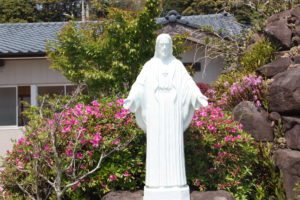 |
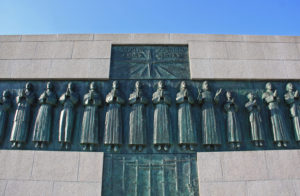 |
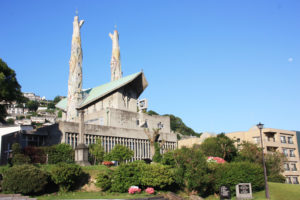 |
1603 Tokugawa Shogunate was established and the natioal isolation policy was applied
1614 The Tokugawa Shogunate prohibited Christianity throughout Japan
1622 five Christians were martyred at Nakae no Shima in Hirado
1624 three Christians were martyred at Nakae no Shima in Hirado
1627 twenty seven Christians were martyred at Unzen Jigoku
1637 Shimabara Rebellion : a peasant uprising against bakufu’s persecution of Christians
under the leadership of Amakusa Shiro
1637 Lorenzo Luiz from Philippines martyred at Nashizaka hill in Nagasaki
1641 Dejima, the small artificial island was opened as Dutch trading port in Nagasaki
1644 Last Christian missionary in Japan is martyred
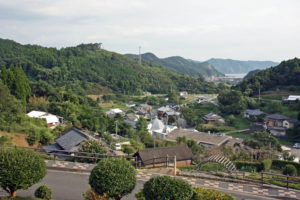 |
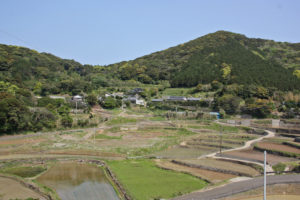 |
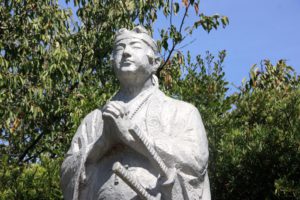 |
1853 Mathew C Perry came to Uraga; the Commodore of the US navy, who played a
significant role in Japanese history, succeeded in opening Japan to foreign countries
1854 Treaty between the USA and Japan : ending the isolation policy and opening the country
1858 Treaty of Amity and Commerce between USA, Netherlands, Russia, England, France and
Japan ; allow religious freedom in foreign residential areas
1862 The 26 Japanese Martyrs at Nishizaka Hill in Nagasaki were canonized by Pope Pius IX.
1865 Oura Cathedral was built as the basilica of Martyrdom of the 26 Saints of Japan
1868 Meiji Restoration, the most important event in Japanese history, which heralded a new era
of modernization in Japan. This revolution restored the imperial rule to Japan after more
than 250years of Tokugawa Shogunate
1873 Ban on the Christianity was lifted
1882 Shitsu Church in Sotome construction started by Father de Rotz’s design
1909 Shitsu Church was completed
1914 Urakami Cathedral construction was completed, it was the largest Catholic church in East Asia
at that time
1912 Yamada Church in Hirado was constructed
1917 Tabira Church in Hirado was constructed
1920 Kurosaki Church was completed by Father de Rotz’s design
1931 St. Francis Xavier Memorial Church in Hirado was constructed at the present location
1945 Atomic bomb dropped in Nagasaki on Aug. 9
The most part of Nagasaki was destroyed, and a tremendous number of lives were lost.
and Urakami Cathedral was completely destroyed.
About 73,000 died instantly, and up to 60,000 were injured.
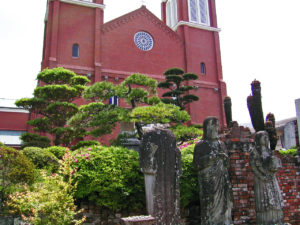 |
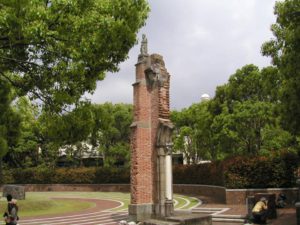 |
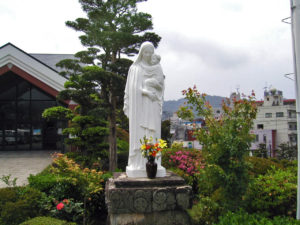 |
1950 Pope Pius XII designated the Nishizaka Hill in Nagasaaki of Martyrdom of 26 Japanese
Saints as an official Pilgrimage site for Catholics
1959 Urakami Cathedral replacement was built
1981 Pope John Paul II visited in Nagasaki
1982 Saint Teresa of Calcutta commonly known as Mother Teresa visited in Nagasaki
1987 Saint Lorenzo Ruiz was canonized by the same pope in the Vatican city on 18 October,
making him the first Filipino Saint
2000 Ebdo Shusaku ( novelist of Silence ) Literary Museum is opened in Sotome
2018 Hidden Christian site is registered on UNESCO’s World Heritage
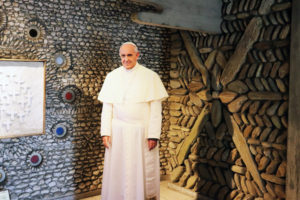 |
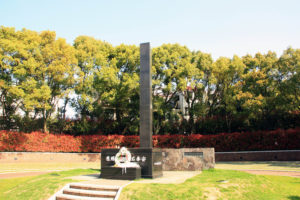 |
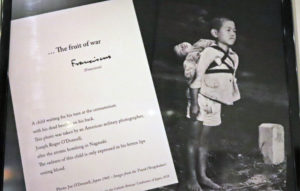 |
2019 Pope Francis visited Nagasaki on Nov.24 and and calls for a ‘world without Nuclear
Weapons’ at the Ground Zero.
